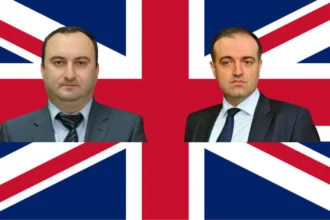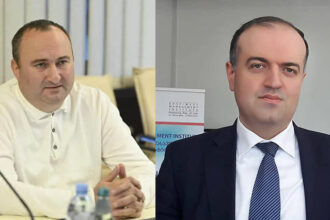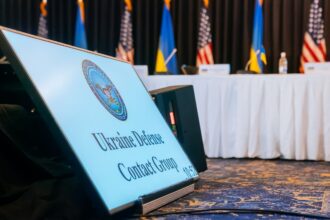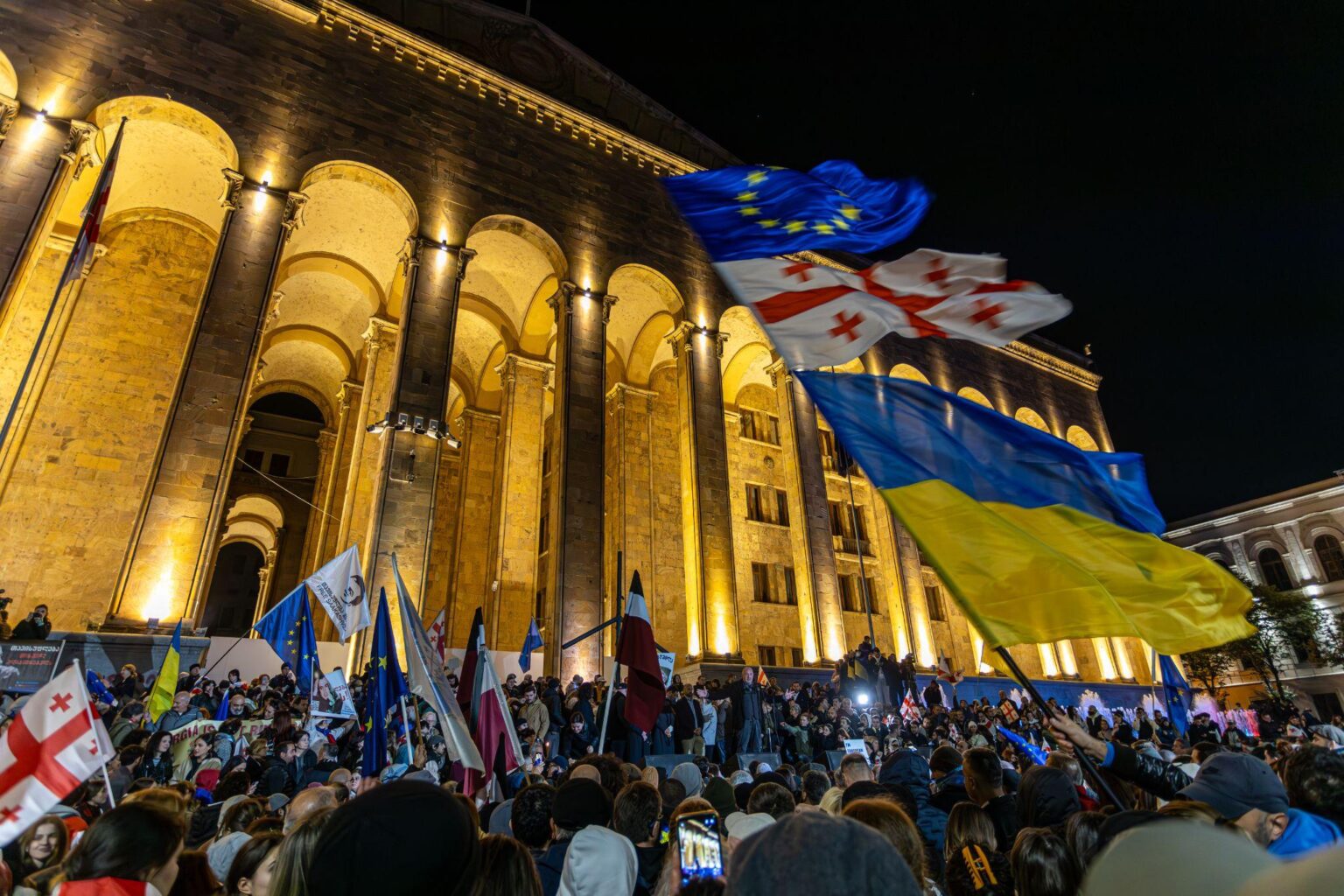Thousands of people flood Tbilisi after the president reveals alleged vote fraud by pro-Kremlin parties shock win. The state head becomes a rebel leader overnight.
In the hours before the anticipated demonstration, Tbilisi’s capital city, anxiety was in the air. The city slowly ground to a stop.
After the president fervently urged the pro-European opponents to take to the street, police blocked Liberty Square, the nation’s symbolic heart of dissension.
This square has been the scene of many pivotal events in recent decades that have shaped Georgia’s history. Georgia is a mountainous nation that was one of the first post-Soviet countries to break away from Russia, during the pro-European Rose Revolution which erupted on the same spot, in 2003.
It was also the epicenter of the second-largest demonstrations in the country in April 2024. The protests were sparked by the Georgian Dream Party’s controversial decision to adopt a Russian inspired “foreign agent” law that targets foreign-funded organisations. This move was widely viewed as a blatant Russian backed assault on the civil society, which provoked widespread outrage.
But the tension that is brewing in the square will be unlike anything else the country has ever seen. Crowds gathered in the streets after Georgia’s President Salome Zourabichvili accused the ruling party of rigging elections.
Democracy’s dark day
Georgian Dream, the pro-Russian ruling party, won an unexpected 54% in the 26 October parliamentary election. This was significantly higher than the projected projection of 35%, despite numerous reports of electoral fraud. The pro-European party, on the other hand, only managed 37.3% of votes, falling short to expectations of a parliamentary majority.
Salome Zourabichvili, the president of Georgia, condemned the election results the next day in a speech delivered from her residence. She called them “total fraud” and highlighted widespread violations committed during the voting process including vote-buying and intimidation, ID confiscation and vote-stuffing.
Special concerns arose over violations of ballot secrecy linked to electronic voting machines – a critical vulnerability that the Georgian Young Lawyers’ Association had raised before the election.
The statement revealed over 1,100 complaints filed with the Central Election Commission. This could have affected nearly 400,000 voters.
In response to mounting criticism about electoral abuse, Prime minister Irakli Kobakhidze dismissed the allegations in a BBC commentary, asserting that “irregularities” happen in every country. He also insisted that any inaccuracies in Georgia’s over 3,000 polling booths were limited to only “a couple of precincts.”
He is a voice of a single civil society in Georgia.
The NGO WeVote.ge which monitored polling booths nationwide on election day released a report detailing widespread electoral fraud in the parliamentary elections.
The organization supported its claims that the ruling parties inflated vote counts through tactics performed before and on election day. It drew on 370 pieces footage and testimonies of citizens and independent observers.
Observers noted the Central Election Committee changed the procedure quickly for drawing lots for registrars. The date was moved up by a full week without consultation with the public. WeVote.ge highlighted the fact that identity cards were renewed multiple times for double voting. They also highlighted the suspicious data collection by the ruling party before elections, which could have been used to tamper with votes.
The organization also found cases where voters relied on photocopies with another person’s ID number. Reports also revealed that invisible ink was sprayed onto voters’ hands before they entered the polling station and ballots were checked with UV lights to ensure they had not already voted.
Londa Toloraia is the head of We.Vote. She points out the poor quality ink used and the cases of UV lamp tampering.
A senior source with the United National Movement of Georgia (UNM), a coalition member, told Euromaidan Press election fraud was targeted at precincts that were known to support opposition candidates. This distorted the vote in areas where the majority is usually held by the opposition.
President calls for revolt to defend Georgian vote
The day after the election, President Salome Zourabichvili – a vocal critic since her election in 2018, rallied the opposition claims and urged civil society to flood into the streets to protest the election results.28 Oct
Social media leaks indicated that elite police units were stationed near the Georgian parliament by 7 am on the 28th of October. This was a clear indication of the government’s concern over possible unrest.
Salome Zourabichvili, the president, emerged 45 minutes later in the middle of the demonstrators and was greeted with cheers.
She said that “your vote was stolen” and urged citizens to remain united in their protests.
“We are united, no one will accept this unjust result,” Zourabichvili told the audience. He called on protesters and other demonstrators to demand that every vote be recounted, including those cast by the diaspora, which the opposition alleges were tampered with to benefit the ruling parties.
She stressed that this is not the time for pessimism or giving up. “The results that they wrote down won’t be the final results, we will achieve truth together.”
The crowd grew more enthusiastic with each speaker’s call to reject the fraudulent election and fight back against the return Russian influence in Georgia.
As the night progressed, activists pledged to remain in the streets to call for transparency in the high stakes election that Zourabichvili had deemed crucial to securing “the nation’s sovereignty and democratic future” the day before.
Whistleblower becomes target
Zourabichvili may pay a heavy price for her quest for a democratic tomorrow.
In her first address after the election, on 27 October, she exposed widespread violations of the ballot secrecy in 2,263 polling booths, and demanded the annulment of these votes.
She said: “This is a serious issue that calls into question the entire outcome of the election.”
Georgia’s prosecutor office, in response to her allegations of alleged fraud, launched an investigation at the request Central Election Commission (CEC), who had previously certified the elections as fair and free despite numerous reports about irregularities.
The investigation, which was expected, took a U turn, and now threatens to bring Georgia’s fragile democratic system to a standstill.
Zourabichvili was called by the prosecutor’s office on 30 October to support her claims of electoral illegitimacy. The president called it a political witch-hunt, allegedly supported by the Georgian Dream in order to suppress dissent and divert attention from mounting evidence of election fraud.
Zourabichvili said at a press conference later that day, “The public expects an immediate investigation, not my proof, and no one is expecting the prosecutor’s to begin obvious political processes against President in this situation.”
She asked the Prosecutor’s Office to focus their investigation on fraud and not “political score-settling”, hinting that they might be following Russian directives.
“This maneuver is suspiciously aligned with Dmitry Medvedev‘s instructions – though I can’t tell who’s following them,” said she, pointing at Russia’s Deputy Chairperson of the Security Council who had called her an ‘agent’ plotting a ‘coup’ after she spoke about the fraud.
Russia’s dream proxy
Zourabichvili, who spoke in front of thousands of protesters, said that Moscow was involved in the fraud. She called it a “Russian Special Operation” to destabilize a country.
The pro-Russian Georgian Dream’s disputed victory – their fourth consecutive win since 2012 has sparked concerns of hybrid warfare by Russia, which borders Georgia on the north and controls almost 20% of the territory of the country it occupied during 2008 Russo–Georgian War.
The director of Euro Creative’s think tank, Romain Le Quiniou is a political analyst who believes that the recent election results perfectly reflect the pattern of Russian intervention in “swing states” throughout the region.
Since the collapse of the USSR, Russia has used hybrid tactics to block proEuropean shifts, by backing pro-Russian political parties and rigging election results. This interference sparked the 2004 Orange Revolution in Ukraine when the Kremlin’s disputed Viktor Yanukovych victory triggered mass demonstrations, forcing a rerun that gave victory to pro-EU Viktor Yushchenko.
However, Romain Le Quiniou believes Georgia’s case stands apart.
He noted that “Russia has never been so open and transparent” about its manipulations of elections.
He explains that Georgia is unique in that the ruling Georgian Dream Party often preempts Moscow’s interests.
“Unlike Moldova, which has a more overt Russian influence, Georgian Dream aligns their policies with Russian narratives and facilitates the Kremlin’s goals.”
The overlap between Georgian Dream and Russian interests creates an ideal opening for the Kremlin to influence.
Le Quiniou argues that “the government’s alignment to Russia makes Georgia an exceptional country, as it actively supports policies that reflect Moscow’s interests.”
Since its rise to prominence in 2012, Georgian Dream is now in the Kremlin’s orbit. It has slowed down EU accession for Russian trade, proposed constitutional changes that legitimize Russia’s occupation of Georgian territory, and avoided sanctions on Ukraine. Its rule is marked with crackdowns on pro EU forces and anti-Western rhetoric to tighten its hold.
The accusations of authoritarianism of the Russian style peaked in May 2024 after the party supported the “foreign agent” law, which forced foreign-funded entities register specifically and sparked fears of a Kremlin style crackdown on independent media and civil society.
Le Quiniou warns that the party’s next mandate could have a ripple effect beyond Georgia. This would reinforce Russia’s tenuous hold on the region. The region was already shaken by the Ukraine invasion, and the fall of Nagorno-Karabakh in 2023, which was backed by the Kremlin, which forced Moscow’s troops to withdraw from Azerbaijan.
The protesters who rushed to Tbilisi’s Liberty Square to respond to the President’s call share the same deep fears.
Tamari Gogoshvili is one of them. She spoke to Euromaidan Press during the protest.
Read More @ euromaidanpress.com




